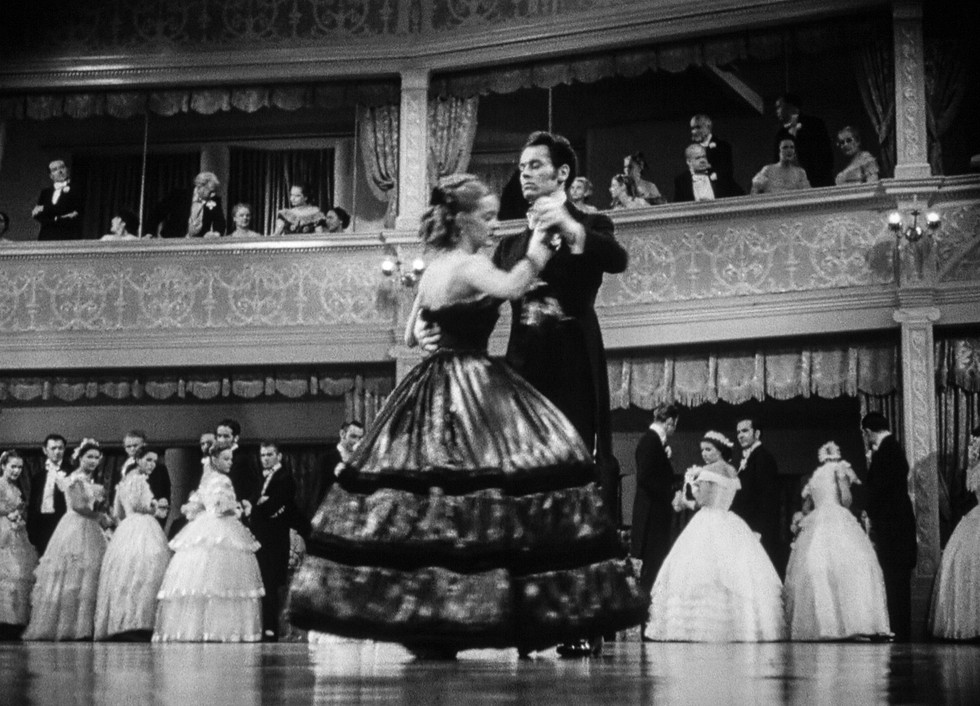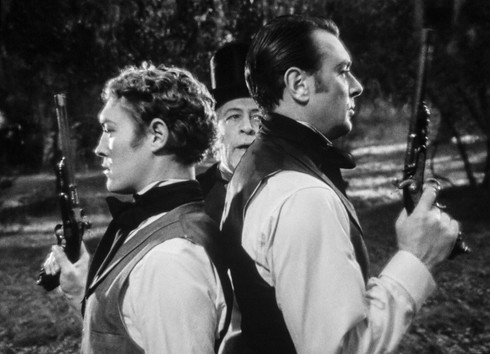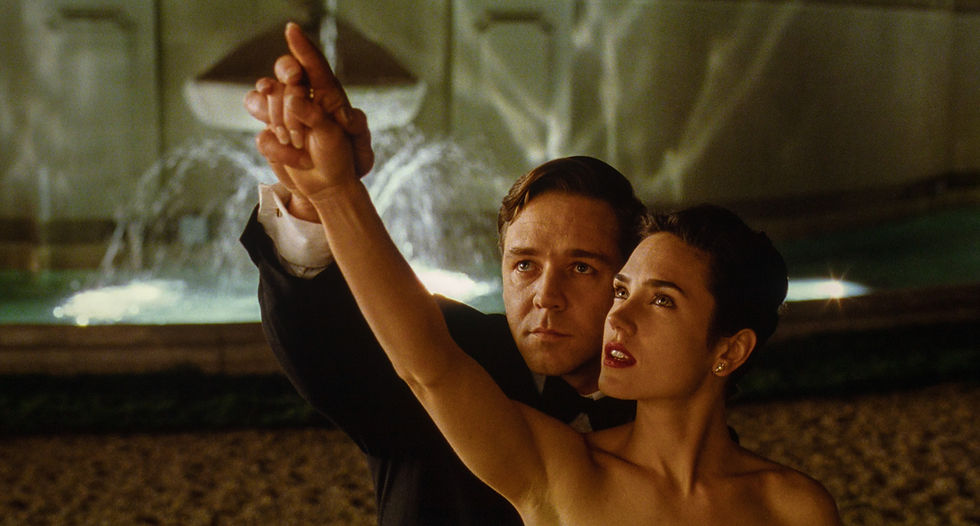Bette Davis’ “Jezebel” – Warner Archive Collection – sparkles in new remaster
- High-Def Watch Staff
- Sep 27, 2019
- 6 min read
BLU-RAY REVIEW / FRAME SHOTS

Henry Fonda and Bette Davis star in "Jezebel" as banker Preston "Pres" Dillard and Julie Marsden. David Wyler, son of William Wyler who directed the film, says his father "wanted to push actors to their limit to get the most basic, honest responses from them as human beings."

“JEZEBEL” – WARNER ARCHIVE COLLECTION
Blu-ray; 1938; Not Rated
Best extra: Commentary with Jeanine Basinger, film professor, Wesleyan University
SHE WAS smart, rich and spoiled – but all she wanted was to wear a red dress when tradition called for white. Julie Marsden, played by Bette Davis in an Oscar-winning performance, ignores customs she considers foolish or outdated. She’s determined to have her own way.
“This is 1852, dumplings, not the Dark Ages. Girls don’t have to simper around in white just because they’re not married.” – Bette Davis, Julie Marsden/“Jezebel”
Julie defies convention by wearing a red gown – a harlot’s color – to the Olympus ball. It doesn’t go over well. Completely shunned, she begs fiancé Preston “Pres” Dillard (Henry Fonda) to take her home, but he refuses. Julie was warned and must pay the price for her rebellious ways. The evening ends as he breaks their engagement and leaves New Orleans. And this is only the beginning.
Like Scarlett O’Hara, Julie is determined to regain his love, but finds he’s married to another upon his return. Amidst tales of abolitionists and a looming war, the threat of yellow fever permeates the story. The ensuing epidemic factors into Julie’s transition to caring woman. Historical records show 7,849 people died. Rich and poor were evacuated as infection increased, most to their deaths. The audience of 1938 and now understand the disease is carried by mosquitoes; not so in 1853 when the outbreak was at its worst, and when isolation seemed the only solution.
(1) Warner Archive Collection aims to please with another brilliant 1080p remaster of a Hollywood classic. (2) Southern charmer and duelist Buck Cantrell (George Brent) refuses to discuss politics. (3) Buck and Aunt Belle Massey played by Fay Bainter, who won an Oscar for the role. (4) Julie shows up late for a party after a day of horseback riding.
The film was considered “just retribution” for Davis. Warner Brothers had successfully sued her when she broke her contract, an ironclad agreement. Standard for the time, it treated actors, writers, directors and crew like indentured servants, and Bettie Davis rebelled. Still, even after winning the suit, Jack Warner had to prove to his star performer he would listen to her regarding the types of films she made and characters she played.
Like every other actress, Davis auditioned for the role of Scarlett O’Hara in “Gone with the Wind.” But Julie/Jezebel is the better part, well-suited for the independent woman who played her. It’s set in 1850, but Davis is actually talking about 1938 when actors, especially women, were controlled by the studio system. Compromise is bitter, but it's a step.
One of “Jezebel’s” best elements is that, despite the old southern glam, characters and actions don’t follow traditional pre-Civil War story tropes. Yes, the slaves are happy and treated well, but Julie’s character transforms as she takes on more relevant conflict. She gets that moment of “It’s not all about me.”
Her aunt, played by Fay Bainter, who also won an Oscar here, is compassionate and smart. Fonda’s character is well-layered, a non-traditional southerner with ideas about improving sanitation and transportation, building trade and ending slavery. He’s willing to work with progressive, like-minded northerners. Then there’s Buck Cantrell played by George Brent, a Warner staple and standout actor. Buck is another smart and charming character, and a good friend to Julie and Pres.
(1) Business concerns, including slavery, are addressed during a meeting at the New Orleans bank. (2) Pres also flies in the face of convention when he demands change.
“[The Antebellum South is] a special kind of sub-culture … a world of magnolias and Spanish moss. It’s different from any other world and, of course, a doomed world.” — Rick Jewell, USC film professor
Wouldn’t it be great if every black and white classic could be remastered with the care Warner Archive shows its films? WAC continues to please with a brilliant 1080p in 1.37:1 theatrical aspect ratio. Ernest Haller of GWTW, “Mildred Pierce,” and “Whatever Happened to Baby Jane,” was nominated for Best Cinematography, and the picture has never looked better. It’s a solid black and white, with outstanding gradations. Highlights in sets, props and costumes are exceptional. Contrast is good in exterior and interior scenes, while the lush grain field highlights dimension. The picture has been cleaned of scratches, dirt and other flaws. “Jezebel” was made to sparkle – and it does.
It was mostly filmed on the studio lot and the Chatsworth Ranch near Burbank. Exteriors were shot on standing sets – including a remarkable scene set in a swamp – with close-ups on location. Set in Louisiana, the film opens with a long tracking shot of the market place in New Orleans loaded with crisp, sharp detail. It was helmed by William Wyler, who also directed Charlton Heston’s “Ben-Hur” and “Roman Holiday” with Audrey Hepburn and Gregory Peck. According to IMDb, Wyler is considered second only to groundbreaking filmmaker John Ford.
Wyler went slightly over budget and schedule for “Jezebel.” An Americanized-German, English was his second language and he had difficulty communicating. Wyler didn’t like to give actors instruction; just had them do a scene over and over until he got what he wanted. He was famous for taking 49 to 80 takes to get the right shot although he saved some money and time by shooting the big scenes at the start of filming. That way he could take more time with intimate scenes.
(1) Julie spots a beautiful red gown during her fitting at the dressmaker's. She decides to wear a similar dress to Olympus ball in retaliation for a perceived slight from her fiancé. (2) Bette Davis won an Oscar for Best Actress for her role as Julie Marsden. (3) Pres and Julie's family are stunned when she appears in the scandalous red gown.

Jack Warner and William Wyler pulled out all the stops to re-create the glamour of the Antebellum South. "[Julie Marsden] is ... innocently self-destructive the way young people can be. Still, she learns from her mistakes, and puts those lessons into action long before the end of the film. Julie isn’t waiting for 'another day.'” — Jeanine Basinger, film professor, Wesleyan University
(1 & 2) Pres defends Julie at the ball, but she soon discovers what a mistake she's made. Music is brought to a halt and society actively shuns her.
A DTS-Master Audio 2.0 mono soundtrack delivers clear and full-bodied dialogue and effects. There are no age-related issues. Max Steiner of GWTW, “Casablanca” and the original “King Kong,” was Oscar-nominated for his score, a sweeping romance of drama and magnolias.
Bonus features are great, but mostly carryovers. Even so, the commentary with Jeanine Basinger, film professor, Wesleyan University, and documentary, “Jezebel: Legend of the South,” are so entertaining and filled with information they’re worth repeat visits.
WAC also provides “a night at the movies-like” experience with featurettes “Melody Makers: Jimmy Dorsey & His Orchestra,” a “Warner Brothers Cartoon: Daffy Duck in Hollywood,” and “Promo/Teaser “Rambling ‘Round the Hollywood Studio with the Candid Cameraman.”
“In most of Bette Davis’ roles, actually, she tends to bring to the part what’s going on in her personal life. In ‘Jezebel’ it’s the same thing … she was trying to make a point about a woman’s place in society at that point in time.” — James Ursini, film historian
“Jezebel” received a Best Picture Academy Award nomination. The surprise and pleasure comes in seeing how well it holds up today. It’s a powerful role played by a unique, powerful woman – a rebel of her time – and a great story from classic Hollywood.
— Kay Reynolds
(1 & 2) Pres returns to New Orleans after a year's absence ... with his northern bride, Amy Bradford Dillard (Margaret Lindsay). (3 & 4) Julie puts on the white dress she originally planned to wear to the ball, and begs Pres to forgive her ... then meets his new wife.
(1 & 2) Pres has returned to beg authorities to take action against the outbreak of yellow fever.

Unable to remain at the table with Pres and his bride, Julie joins the slaves outside. “‘Jezebel’ came out the year before GWTW, but it’s always been linked. GWTW was a bestseller before it was made into a movie, and the reason ‘Jezebel’ was made was to take advantage of the interest in the Antebellum South.” — Rudy Behlmer, film historian
(1) Buck finds himself in a duel with Ted Dillard (Richard Cromwell) to defend Julie's honor. (2) Ted, younger brother to Pres, rebukes Julie. (3) Julie is stunned by the results of the duel. She realizes her pride and anger have pushed her too far.
(1) As Pres and Dr. Livingston warned, yellow fever becomes a raging epidemic. Rich and poor are evacuated from the city. (2) Pres is stricken with the fever. (3) Julie begs Amy to allow her to go with Pres and care for him. “Do you know the Creole word for fever powder, for food and water? How to talk to a solid, over-worked black boy and make him feel he will help you? Pres's life and yours will hang on things just like that … Amy, it’s no longer you or me.”

















































Comments